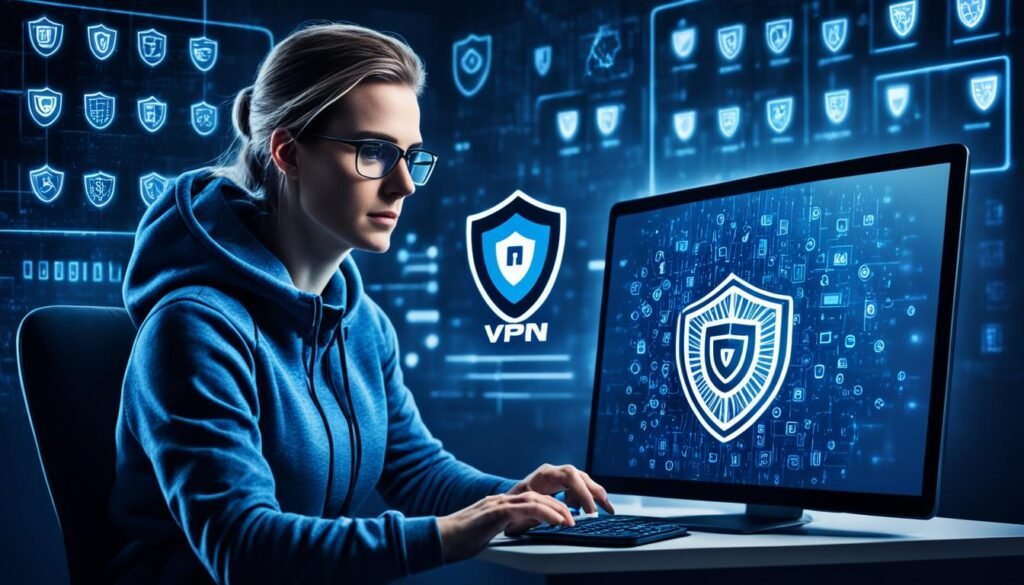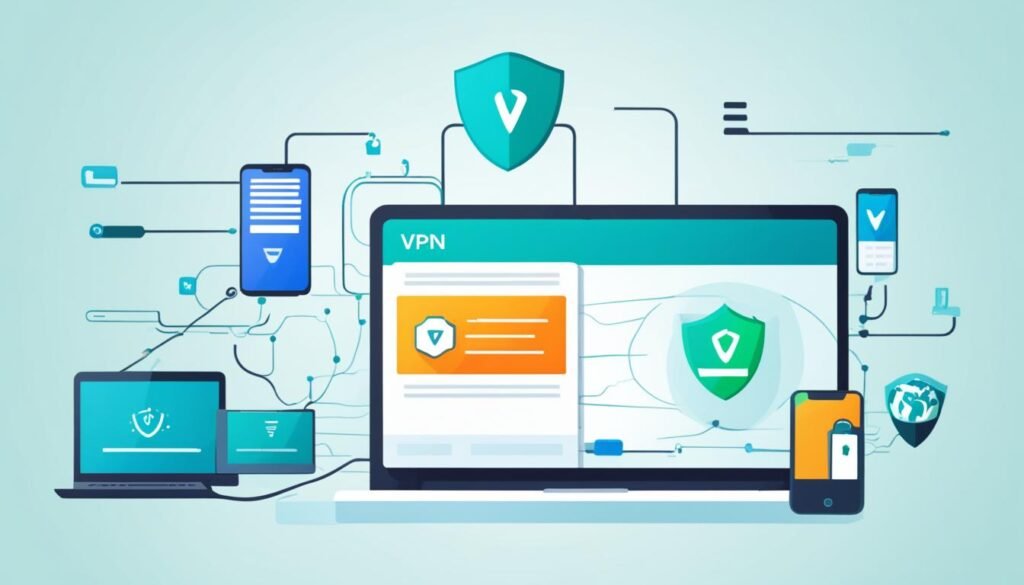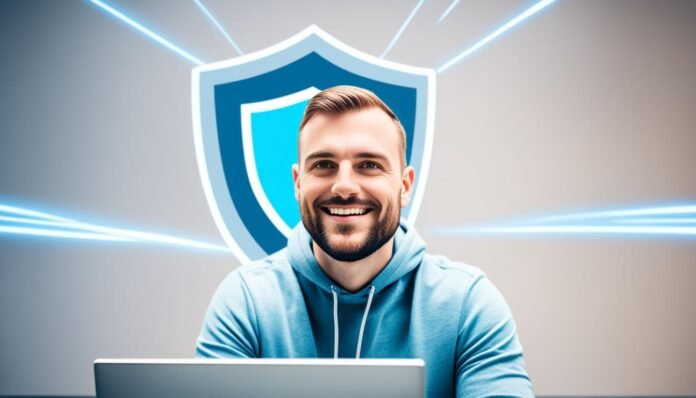Keeping your privacy online is more important than ever today. With the rise of cyber threats and data breaches, it’s crucial to browse the web safely. A Virtual Private Network (VPN) offers strong protection by hiding your online actions.
For those new to this, diving into VPNs might seem tough, but it’s not so complicated. They play a big role in keeping your personal info safe. Making a shift to private browsing is essential, and a VPN is a good first step.
Key Takeaways
- Understanding VPNs is crucial for enhancing online privacy.
- A VPN can help secure browsing activities from potential threats.
- Users should prioritize online security in today’s digital landscape.
- VPNs are essential tools for beginners looking to protect their internet usage.
- Transitioning to a privacy-focused approach is easier with the right tools.
Understanding What a VPN Is
A Virtual Private Network (VPN) helps internet users stay safe and private online. It is important to know the definition of VPN to understand how it works. Essentially, a VPN secures and encrypts your connection over the internet. This encryption helps keep your data safe from threats. It also hides your IP address to keep you anonymous.
Definition of a VPN
The definition of VPN shows it acts like a digital tunnel for your device. It encrypts your internet activity, keeping it away from prying eyes. This is why VPNs are loved by those wanting to keep their online actions private. In a world full of online spying and data leaks, VPNs are crucial.
History of VPN Technology
VPN technology started in the early 90s for business use. It helped employees securely connect to their company’s networks from afar. As people became more concerned about online privacy, VPNs became vital for personal use too.
Major steps in VPN development include better encryption and easy-to-use apps. Nowadays, VPNs keep adapting to protect against new threats and meet user needs. They are key for safe and professional online activities.
Importance of Online Privacy
Today, our personal information is more at risk than ever before. Not using a VPN can leave us open to dangers. By securing our online presence, we keep our personal info safe and reduce data breach risks.
Risks of Not Using a VPN
Skipping a VPN means facing many privacy dangers. Users might:
- Unauthorized access: Hackers could steal unencrypted data, risking identity theft.
- Data breaches: Exposed online info could lead to financial loss.
- ISP monitoring: ISPs may track and sell your activity data.
How Browsers Track Your Activity
Web browsers collect data on our online habits. Here’s what they do:
- Cookies: These files remember us and track our web journey, letting firms profile us.
- Web beacons: Invisible on web pages or emails, they check how we interact.
- Analytics tools: Sites use these to study visitor actions, collecting loads of data.
Without a VPN, we risk having our information misused and getting bombarded by targeted ads. Using a VPN keeps our internet connection secure, protecting our online privacy.
How to Use a VPN for Safe Browsing
Learning to use a VPN can really up your online safety and keep your private stuff private. This guide will help you get your VPN running and offer tips if you’re just starting out.
Step-by-Step VPN Setup Guide
- Select a reputable VPN provider such as NordVPN, ExpressVPN, or CyberGhost.
- Download the VPN application compatible with your device’s operating system.
- Create an account by providing your email and choosing a secure password.
- Log in to the application once it installs on your device.
- Configure settings to enhance privacy, including selecting encryption options.
- Choose a server location based on your needs. Servers closer to your location usually give you faster speeds.
- Click the connect button to establish a secure connection.
Common VPN Usage Tips for New Users
Here are some key tips to make the most out of your VPN:
- Keep your VPN app up to date to get the newest security stuff.
- Try different server locations to see which one works best for streaming or surfing.
- Know about any data limits, which might change your speed and how much you can use.
- Set up alerts to let you know if your VPN drops unexpectedly.
- Check out the privacy and logging policies to make sure your information stays safe.

Choosing the Right VPN Service
Finding the best VPN service can really make your online life better. When picking a VPN, it’s critical to know the features that matter most. You want a VPN that’s fast, secure, and easy to use.
Key Features to Look for in a VPN
- Speed: A speedy VPN makes watching videos and browsing smooth.
- Security Protocols: Strong encryption, like OpenVPN and IKEv2, is key.
- Logging Policies: Choose VPNs that don’t keep your activity logs.
- Customer Support: Good support helps fix any issues quickly.
- Device Compatibility: Make sure the VPN works on all your devices.
Top VPN Services in 2023
In 2023, some VPNs have really stood out. Below is a list of the top VPN services based on features and user reviews:
| VPN Service | Speed (Mbps) | Security Protocols | No-Logs Policy | Price per Month |
|---|---|---|---|---|
| ExpressVPN | 89.42 | OpenVPN, IKEv2 | Yes | $6.67 |
| NordVPN | 87.29 | OpenVPN, IKEv2, WireGuard | Yes | $3.71 |
| CyberGhost | 83.14 | OpenVPN, IKEv2 | Yes | $2.75 |
| PIA (Private Internet Access) | 80.55 | OpenVPN, WireGuard | Yes | $2.85 |
VPN Benefits for Everyday Users
Everyday users get big perks from using a VPN. It’s not just for staying private online. It also lets users reach more online content and boosts security.
Enhanced Security Against Cyber Threats
A VPN keeps users safe from cyber dangers. It makes a secure path for internet data, protecting against hackers. This is key when using public Wi-Fi, as these spots are often unsafe.
With a VPN, browsing is safer, lowering chances of phishing and malware.
Access to Restricted Content
VPNs let users bypass content blocks. This means more entertainment options, like global streaming services and websites. It hides the user’s IP address.
This lets you dive into varied media libraries and exclusive events. It’s a big plus for those who look for specific content online.
| Benefit | Description |
|---|---|
| Enhanced Security | Protects against hacking and malware on public networks. |
| Access to Global Content | Unblock content from various streaming services. |
| Privacy Protection | Masks IP address and encrypts online activity. |
| Prevention of ISP Throttling | Maintains consistent connection speeds while browsing. |
VPN Tutorial: Setting Up Your VPN
Setting up your VPN makes your online life much safer. This guide covers installing a VPN on various devices. It ensures you can browse the internet safely. Getting your VPN configured right makes it work better and more reliably. Let’s look into installing and fine-tuning your VPN for peak performance.
How to Install a VPN on Different Devices
How you install a VPN depends on what device you’re using. Below are steps for getting your VPN up on common devices:
- Windows: Download the VPN software from your provider’s website. Follow the installer prompts, and launch the application once installed.
- Mac: Visit your VPN provider’s site, download the Mac version, and drag it into your Applications folder. Launch the app and log in.
- Android: Open the Google Play Store, search for your VPN app, and click “Install.” Once downloaded, open the app and sign in.
- iOS: Go to the App Store, find your VPN app, and tap “Get” to install. After installation, open the app and log in.
Configuring VPN Settings for Optimal Performance
Once you’ve got your VPN running, tuning it can boost its function. Here are a few hints:
- Select the fastest server: Use your provider’s app to find a quick server nearby.
- Activate kill switch: This stops your internet if your VPN drops, keeping you private.
- Enable split tunneling: This allows some apps or sites to bypass the VPN. It speeds things up for less critical tasks.

By following this guide and fine-tuning your settings, your online experience will be safer and smoother. You’ll browse securely, knowing your info is safe on all devices.
Common Myths About VPNs
Online privacy is becoming more popular, bringing misconceptions about VPNs with it. Many folks misunderstand how they work, leading to confusion. Learning the truth behind these VPN myths helps make smart choices about staying safe online. We’ll tackle these myths to show what VPNs really do.
Debunking Misconceptions
A common myth is thinking VPNs are illegal. But, only a few countries restrict them; in most places, they’re entirely legal. Some believe VPNs slow down the internet a lot. Yet, modern VPNs are often just as fast as regular internet.
Realities of VPN Performance
The truth often surprises people when it comes to misconceptions about VPNs. Research shows good VPNs don’t lag behind regular internet speeds much. Customers usually find their browsing isn’t slowed down, especially with high-quality services. Picking a top-notch provider makes all the difference in your internet experience.
Comparing VPNs with Other Internet Security Tools
It’s crucial to know how VPNs stack up against other internet security measures. When we look at VPNs compared to proxy servers and firewalls, we learn a lot. We see what each offers in terms of protection.
VPNs vs. Proxy Servers
VPNs and proxy servers both hide your IP address, but they do so differently. A proxy server sends your internet traffic through another server. This gives you some privacy. Yet, it doesn’t encrypt your data, leaving your info at risk.
In contrast, a VPN encrypts your data in a secure tunnel. This keeps your data safe from others.
VPNs vs. Firewalls
Firewalls work as a shield, blocking dangers from your network. They check traffic but don’t encrypt data. So, they can’t protect your data when it’s sent or received.
VPNs, however, encrypt everything. This means they keep your data secure, both coming and going. Knowing these differences can help you pick the right tool for staying safe online.
Conclusion
In today’s world, being online means you need to stay safe. A VPN is a great tool for this. It keeps your online actions secure and makes your internet experience better. VPNs help keep your data safe from hackers, protect your privacy, and let you access blocked content.
Wondering why to use a VPN? It’s simple. A VPN protects your personal info on public WiFi and hides you from government and ISP tracking. Whether you’re shopping, playing games, or just surfing the web, a VPN keeps you safe. It offers a security layer that is often missed until something goes wrong.
To improve your online experience, look into different VPN choices. As we’ve shared, securing your online world is essential—not just a bonus. A VPN upgrades your internet use and secures your online steps. For tips on starting, check out this resource.


